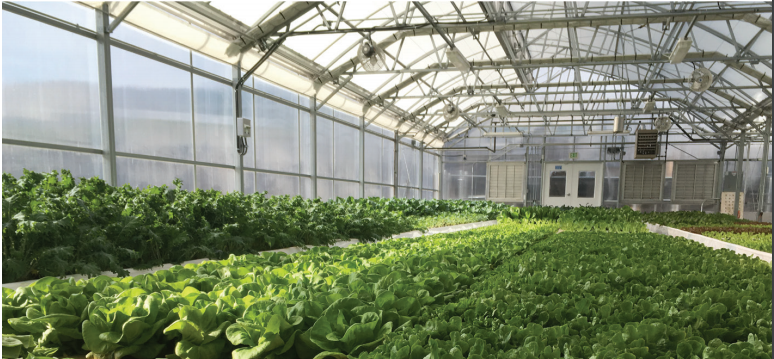Startup Spotlight: Sharjah-Based Merlin Farms Is Addressing MENA's Water Scarcity And Food Security Issues Through Aquaponics Merlin Farms' farming technique is based on the concept of aquaponics -a combination of aquaculture and hydroponics- which can grow plants without soil by utilizing fish waste.
By Aalia Mehreen Ahmed Edited by Aby Sam Thomas
Opinions expressed by Entrepreneur contributors are their own.
You're reading Entrepreneur Middle East, an international franchise of Entrepreneur Media.

This article is part of an ongoing series covering startups that have been a part of the Mohammed Bin Rashid Innovation Fund (MBRIF) accelerator program.
Killing two birds with one stone- that's perhaps a good idiom to describe Sharjah-based agritech startup Merlin Farms' offering, which, besides addressing the Middle East's water scarcity issues, also contributes to safeguarding the region's food security as well. "Merlin Farms' farming technique is based on the concept of aquaponics -a combination of aquaculture and hydroponics- which can grow plants without soil by utilizing fish waste," explains Suhail Bachani, who co-founded Merlin Farms with Rohit Bachani and Hiro Bachani. "The nutrient-rich water from the fish tanks is utilized by the vegetables that grow directly with their roots in the water, thereby cleansing it. This circularity of the system saves water compared to hydroponic and soil-based farming. We thus have two end products for sale: vegetables and fish."
Merlin Farms was founded in 2018 at the Sharjah Research Technology and Innovation Park (SRTIP), with its main offering, the Merlin Commercial Aquaponic System, currently enabling the cultivation of "highly in-demand" crops such as spinach and kale. "Our commercial farming systems allow for crops to be harvested daily to meet market demand, starting from half a ton produced per day using multiple fish tanks," Suhail explains. "Aquaponic farming requires very less water as compared to soil-based farming as well as hydroponic farming, and our modulated system can be duplicated for expansion, allowing an easy increase in size as the business grows."

While aquaponics remains the startup's key offering, it is now also tapping into other areas of agritech as well as renewable energy. "Merlin Farms also offers agrotunnels, which are state-of-the-art climate-controlled, antibacterial, earth-sheltered structures that consume less electricity, to create what we believe is the highest yielding indoor cultivation system," Suhail says. "We also contribute to a better environment by using Merlin's innovative wind and solar renewable energy solutions to solve problems of energy, water scarcity, and food security."
By introducing aquaponics to the UAE and the wider Middle East region, one of Merlin Farms' key unique selling points lies in its ability to offer chemical-free produce, says Suhail. "We want to enable local production of fresh food year-round, as well as the ability to farm anywhere, in all seasons, by using less water, less energy, and no pesticides, while at the same time contributing towards the UAE's mission towards food security," he explains. "Merlin Farms intends to replace daily food and produce that is contaminated by the conventional use of chemicals, herbicides, and insecticides with nutritional, non-toxic crops, and protein. Aquaponics is the only modern farming system that produces pure food without any additives or too much labor-intensive intervention. The issues of environment, chemicals, climate, soil, water, space, labor shortage can thus be corrected by one solution: aquaponics!"
Related: Startup Spotlight: Dubai-Based Dukkan Aims To Provide Local Retail Stores With A Digital Edge
 Source: Merlin Farms
Source: Merlin Farms
According to Suhail, there is a lot of potential for his company's utilization of aquaponics to be embraced by the population at large. "Our smart aquaponic farms and greenhouses are designed to be effortlessly adapted in homes, schools, and communities," Suhail explains. "At home, an aquaponic farm can easily feed a family of four all-year-round by combining advanced sensors and remote management to provide a mix of over 100 herbs and vegetables. In schools, farms can be created using aquaponic techniques and also be included as part of the curriculum to teach our promising new generation the importance of sustainable farming and practical life techniques. What this does is provide an opportunity for the wider communities to purchase food that is grown within their own premises, using the least amount of resources and 90% less water but with yields that are three to four times greater than traditional farming methods."
Suhail believes joining the MBRIF accelerator program will help Merlin Farms in implementing its vision on a greater scale. "The MBRIF is a great platform to improve the overall attitude and commitment toward caring for the environment," he says. "But the program will also be very helpful in overcoming the financial challenges we are currently facing as a self-funded company for our expansion."
As Merlin Farms now aims to scale its services in a manner that aligns with the UAE government's initiatives to achieve food security and sustainable agricultural practices, the roadmap for the journey ahead has already been laid out. "In the next few years, we plan to operate 50 such indoor aquaponic farms that will cater to the market demands by producing vegetables and fish yearround," Suhail says. "We are also very excited about the farm-to-table concept restaurant which will be adjacent to our farm at SRTIP. Adoption of a licensing model that will harness the power of artificial intelligence and automation in our services is also on the cards. And finally, we intend to introduce training courses for the community at large, as well as school students- that is what we believe will truly enhance our overall development as a firm!"










